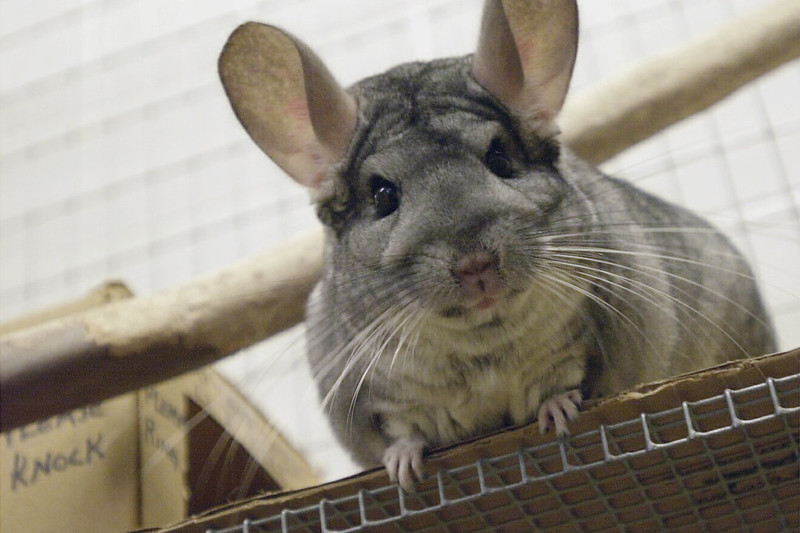
Chinchillas
As owners will happily tell you, chinchillas are friendly, inquisitive and easy to look after, yet they can be a little bit shy. With this understanding at the forefront of our experts’ minds, OlliePets offers a great selection of chinchilla cages, bedding and food. Be sure to check out some advice bellow for more information on these fantastic pets!
Owning a chinchilla

If you’re looking for a clean, quiet rodent, a chinchilla could be the pet for you. They usually live for between 15 to 20 years, and the time you spend with your new friend will be really rewarding.
Originally hailing from the Andes mountains in South America, chinchillas are both active and agile. Your new pet might be able to jump as high as six foot, so watch out for them leaping onto your fridge or kitchen top! As they’re such bundles of energy, they need plenty of stimulation. Always make sure your chinchilla has lots of exercise and toys to play with.
In the wild, chinchillas live in colonies of up to a 100. As they’re such social little creatures, you should consider getting a pair so they can keep each other company. They like to sleep during the day though, meaning playtime is best in the evening and at night.
Caring for your Chinchilla
You need to make sure your pet chinchilla has lots of hay to gnaw on. Their teeth will continually grow for their whole life, and abrasive things like hay will stop them getting too long.

All Products
Chinchilla health

Chinchillas make great pets and with all of your furry friends it is always essential to keep a close eye on their health, Chinchilla’s can be prone to suffering from bloat, a gastrointestinal illness that is caused by a buildup of gas. It is important to look after your chinchillas and ensure they remain in good health at all times, so here we will take you through the key things you need to know.
Keeping your chinchilla happy and healthy
Chinchillas have become increasingly popular as domestic pets and it’s easy to see why. With their attractive looks and endearing personalities, owning a chinchilla can be an incredibly rewarding experience. Whether you’re an experienced chinchilla owner or are thinking about welcoming one of these rodents into your home for the first time, you’re sure to want to do everything possible to keep your pet happy and healthy. That’s why it’s so important to do your research to learn more about caring for these amazing animals. To help get you started with learning more about chinchilla health, we’ve put together a helpful guide below.
Giving your chinchilla the right environment
![[object Object]](https://i1.adis.ws/i/petsathome/grey_chinchilla_in_cage.jpg?qlt=50&w=400)
The right environment is important for your chinchilla. Hailing from the Andean mountains in South America, chinchillas are perfectly equipped to cope with the dry, cold weather and the rough terrain of the region. That’s why it’s important to try to give your chinchilla an environment that mimics their natural habitat as much as possible. In fact, a poor environment could cause illness or injury.
Your chinchilla’s environment should be:
- Large and secure – chinchillas are active and athletic, meaning they need plenty of space to run and jump in their enclosure. They also tend to be curious, so their enclosure should be safe and secure to prevent injury.
- Free from draughts, humidity and inconsistent temperatures – these animals are used to the dry environment of their natural habitat, meaning a too-humid home could cause illness. Be sure to keep their enclosure at a consistent, comfortable temperature too.
- Multi-leveled – chinchillas love to explore, which means you should provide safe and secure places for them to jump up and investigate. Just be sure that these don’t exceed 60cm of uninterrupted height, as such a large jump could cause injury.
- Cosy and safe to sleep in – it will be important to provide some safe areas for sleeping and resting for your chinchilla. Housing within their enclosure will give them a space to retreat to and will be a great way to keep your chinchilla feeling safe and calm. Be sure to provide chinchilla-safe bedding, like clean hay, for them to snuggle into too.
Choosing the right food for your chinchilla
Like all pets, chinchillas need the right diet to maintain good health. Typically, chinchillas need:

- Good quality hay – this tends to make up most of their diet
- Grass-based pellets – developed to meet the needs of chinchillas, grass-based pellets can be a great way to supplement their diets and can be given daily
- Fruit and root vegetables – while chinchillas don’t necessarily need these in their diets to stay healthy, they can be provided as an occasional treat, just make sure you don’t overdo it
It will be important to avoid overfeeding your chinchilla, or giving them the wrong type of food (such as too many nuts and seeds), as this could cause your pet to become overweight. Obesity can cause a range of health problems, so be sure to monitor your chinchilla’s weight closely.
Spotting the signs of illness or injury
It’s not always easy to know when your pet is ill, and with chinchillas it can be even more difficult. As prey animals, chinchillas are adept at keeping any signs of injury or illness well hidden. That’s why it will be essential to keep a close eye on your pet and visit your vet immediately if you have any concerns.
Some signs of illness or injury in chinchillas can include:
![[object Object]](https://i1.adis.ws/i/petsathome/Close_up_of_grey_chinchillas_face.jpg?qlt=50&w=400)
- Changes in toilet habits – if the number of or size of droppings your chinchilla is passing reduces or stops completely, it will be important to visit your vet, as this could indicate that your pet is unwell.
- Changes in eating habits – chinchillas typically eat at night and can eat for long periods of time. If you find that your chinchilla is not eating as they normally would or isn’t drinking water (or is drinking too much), it could be a sign of injury or illness, so seek veterinary advice.
- Changes in behaviours – chinchillas are active animals and tend to be busy during the night. If you find that they are quieter than usual or are behaving differently than they would normally, it could be a sign that something isn’t quite right.
- Changes in appearance or movement – Your chinchilla’s appearance is a good indicator of their overall health. If you see a drastic change in the way they are moving or in their appearance, such as fur loss, wetness around the eyes and mouth or a reluctance to move, it could be a sign that something is wrong.
If you are concerned about your chinchilla’s health, it’s important to visit your vet. They will be able to advise if there is anything you need to change about your pet’s environment or diet, or whether there is an underlying illness that could be affecting their health. It’s always a good idea to take your chinchilla for an annual check with the vet, even if everything seems fine.






